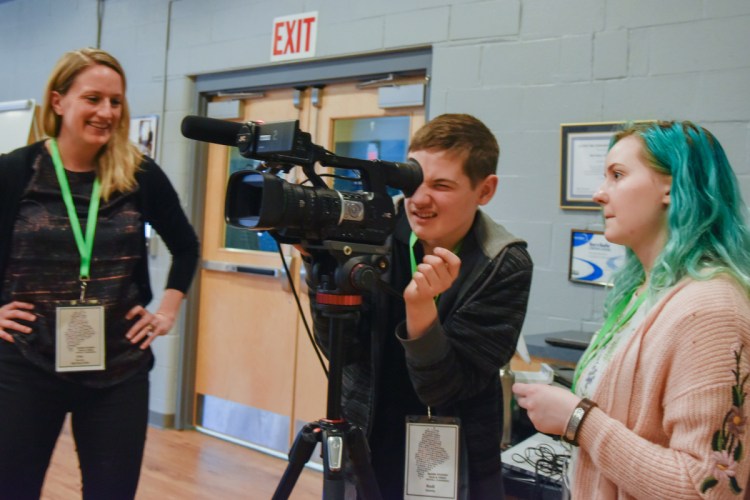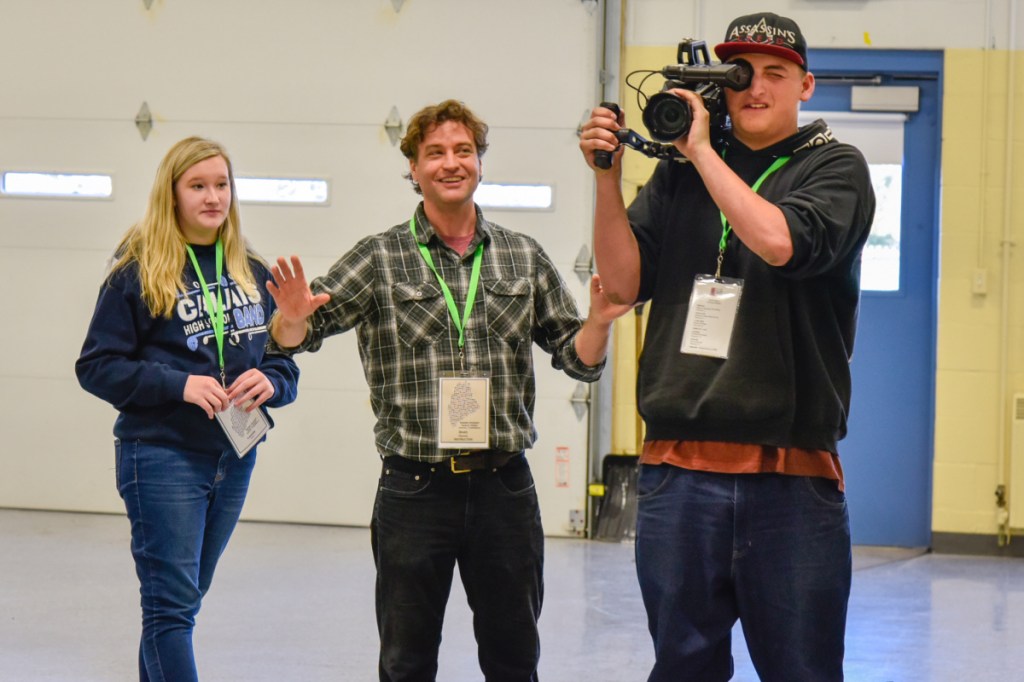WATERVILLE — Sarah Thomas leaned into the video camera, turned it slightly on its tripod and directed Kodi Quimby to look at her when he spoke.
“OK, let’s go,” she said. “First, spell your name for me.”
Thomas, 17, of Bangor, and Quimby, 13, of Starks, were practicing interviewing skills Saturday in a workshop titled “Inspiration to Interview: Producing the Documentary,” held as part of the Maine Student Film & Video Conference at Mid-Maine Technical Center.
The all-day conference, coordinated by the Maine Film Center and MMTC’s mass media communications program, drew more than 200 middle and high school students from around the state, and some 50 professional filmmakers, to take part in workshops on narrative and documentary filmmaking, video journalism, technical production, directing, sound and other subjects.
Thomas and Quimby were among about a dozen students in the documentary workshop taught by Erin Murphy, a filmmaker and cinema studies instructor at Colby College.
Before splitting into groups and doing mock interviews, the students learned about how to identify a potential documentary subject, plan and schedule an interview and shoot the interview using cameras and working with lighting.
Quimby played the founder of a successful whoopie pie company; Thomas asked him questions, while feeding off his answers to develop further questions.
“All right, so you are the founder of a whoopie pie business. What made you want to start this?” she asked.
“Well, my Dad made whoopie pies, and that kind of made me want to try that. So I asked him how to do it, and he taught me how to bake them.”
“So it’s a family business,” Thomas replied. “How is the business going? Is it successful?”
The interview continued. Afterward, Thomas, who is home-schooled but takes classes at the United Technologies Center in Bangor, said it was a good exercise. She is familiar with cameras and takes a commercial video communications class at the center, but she has not had much experience with the style of video making she explored Saturday, she said. Thomas hopes one day to work in the field.
“I’d love to go into something related to film,” she said. “I love sound mixing. … I’d like to keep going with it if I can find schools, internships, and work up from there.”
Quimby, who also is home-schooled, said he is somewhat interested in film but doesn’t think he excels at that sort of thing. Even so, he enjoyed the workshop and found being interviewed a challenge.
“It felt kind of weird,” he said. “Some of the questions I wasn’t really prepared to answer.”
Murphy, who later taught another student workshop, as well as one for teachers, encouraged students to carry a notebook wherever they go and jot down ideas, think about what kind of documentary film they want to make, find out as much as they can about a potential subject and email the person and explain in detail what they want to do. Follow up with a phone call, Murphy advised.
Thinking about locations is important, as a subject can be interesting, but without a background that adds to the story, it is less compelling, according to Murphy. Having a subject actually working on something makes it even better, she said.
Elsewhere at the conference, students were learning about digital animation; shooting with drones; elements of soundtrack, editing, makeup and special effects; and other subjects.
Henry Spritz, a high school student and filmmaker from Portland, talked about his short film, “Oldtown,” which was a national finalist in the YoungArts competition. The film is about Maine, Maine people and images.
Spritz spoke of how people always told him he needed expensive equipment to make a film, he needed to know all about cameras and how to operate them and he must include certain aspects such as dialogue in films.
But he made his short film using a regular, relatively inexpensive camera that had video capability and went with his gut, gathering friends to be in the film and using ideas and certain images and feelings he wanted to portray. After all was said and done, he had produced a film that became a finalist.
“In the end, it felt so good. I felt so proud of it. It represented so well what I originally wanted.”
Spritz said he asked the director of the Miami International Film Festival if, when selecting a movie for an award, he chooses it based on its professional nature and whether it is made with expensive equipment.
“He said if the movie is authentic, original, powerful and honest, that’s what matters,” Spritz recalled.
Mike Perreault, executive director of the Maine Film Center, said the conference was going extremely well.
“We have over 200 students and teachers from all over the state,” he said, adding that the conference was the first one held in at least a decade.
“We’re so excited to be offering this in Waterville — the heart of central Maine. We plan to do it again in years to come, and we hope it’s a way for students to learn more and be part of the Maine Student Film and Video Festival, which will be held during the Maine International Film Festival in July.”
David Boardman, the mass media communications instructor at MMTC, echoed Perreault’s comments.
“What I think I am most impressed about is how engaged these young people are in video and film production. For us, it’s a chance to show them the best of what Maine professionals are doing and how technical centers can help kids explore these careers. To me, that’s the driving force behind it — helping young people make that connection between possibilities and their interest and figuring out what is interesting in the world.”
Event sponsors were Waterville Creates!, Maine Public’s Raise Your Voice! program, Maine Media Workshops + College, New England School of Communications, and the Brook Family Foundation.
Amy Calder — 861-9247
Twitter: @AmyCalder17
Send questions/comments to the editors.






Comments are no longer available on this story